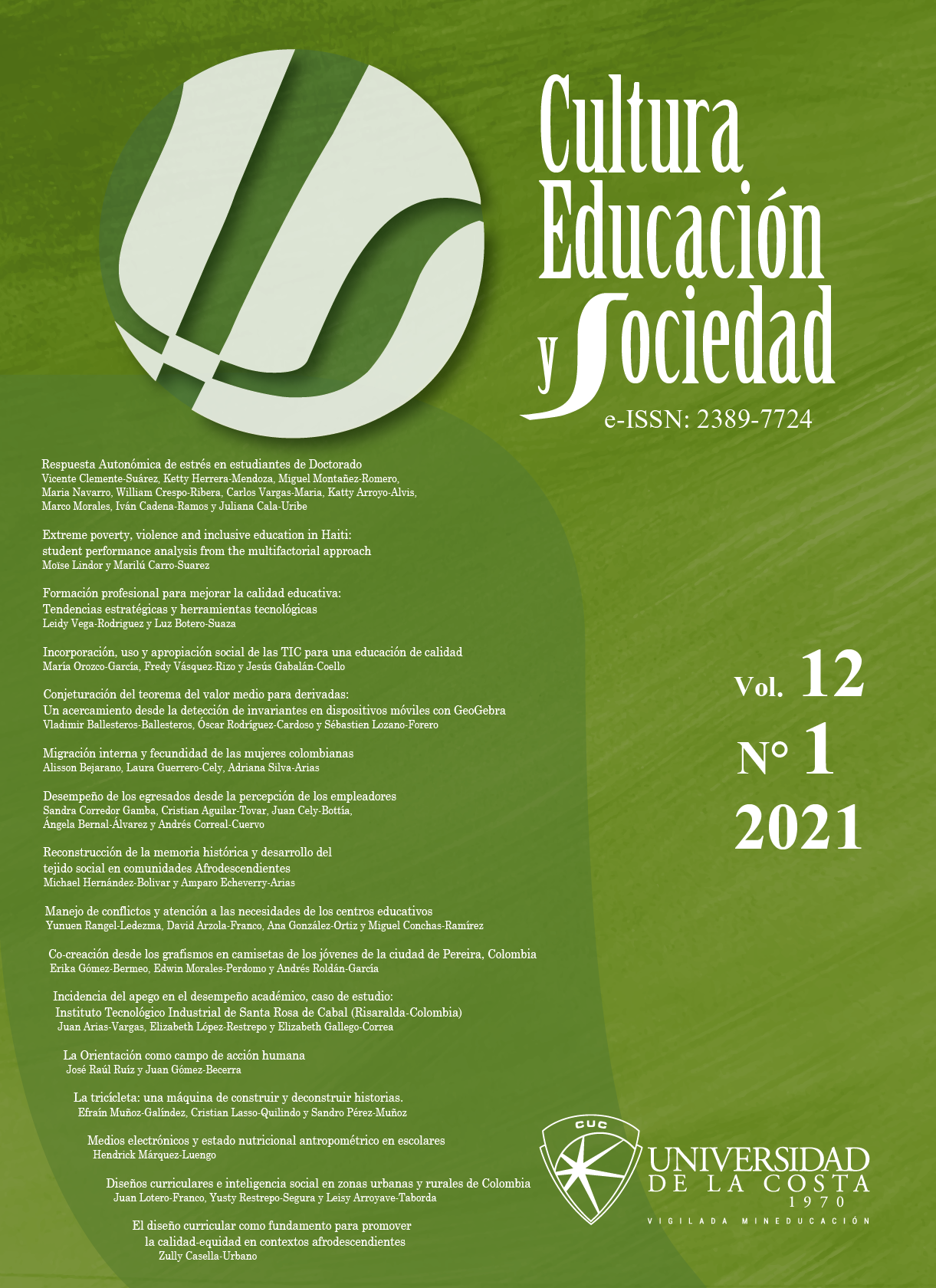Filosofía educativa personal y devenir ideológico: de la práctica individual al significado social
DOI:
https://doi.org/10.17981/cultedusoc.12.1.2021.20Palabras clave:
Devenir ideológico, Filosofía educativa personal, Práctica reflexiva, Formación docenteResumen
La escritura de una filosofía educativa personal puede interpretarse como un componente dinámico en el desarrollo del sistema de ideas del docente, su yo ideológico. En este artículo de reflexión se examina el ejercicio reflexivo y de crecimiento personal que el desarrollo de una filosofía educativa personal promueve de acuerdo con algunos modelos de escritura disponibles. A través de un método documental, se precisan los supuestos y las creencias en cuestión para interpretarlos bajo los conceptos bakhtinianos de heteroglosia y devenir ideológico. El examen de la heteroglosia en el texto aumenta la conciencia de la actividad docente individual al conectarla con las prácticas sociales, culturales y políticas más amplias construidas a través de la escritura. Estas consideraciones tienen por objeto vincular las actividades de los educadores con la posibilidad de sociedades más democráticas.
Descargas
Citas
Arán, P. (2006). Nuevo diccionario de la teoría de Mijaíl Bajtín. Córdoba: Ferreyra Editor.
Bakhtin, M. (1981). Discourse in the novel. In M. Holquist (Ed.). The dialogic imagination: Four essays by M. M. Bakhtin. (C. Emerson & M. Holquist, Trans.). Austin: University of Texas Press.
Beatty, J., Leigh, J. & Dean, K. (2009a). Finding our roots: An exercise for creating a personal teaching philosophy statement. Journal of Management Education, 33(1), 115–130. https://doi.org/10.1177/1052562907310642
Beatty, J., Leigh, J. & Dean, K. (2009b). Philosophy rediscovered: Exploring the connections between teaching philosophies, educational philosophies, and philosophy. Journal of Management Education, 33(1), 99–114. https://doi.org/10.1177/1052562907310557
Bohnsack, R., Pfaff, N. & Weller, W. (Eds.) (2010). Qualitative Analysis and Documentary Method in International Educational Research. Barbara Budrich Publishers. Available from: http://library.oapen.org/handle/20.500.12657/29452
Brookfield, S. (2017). Becoming a Critically Reflective Teacher. John Wiley & Sons.
Cathcart, A., Greer, D. & Neale, L. (2018). About Teaching Philosophies. [Online]. Available from: https://teachingadvantage.org/about-teaching-philosophies/
Chism, N. (1998). Developing a philosophy of teaching statement. Essays on Teaching Excellence, 9(3), 1–2. Available from: https://ucat.osu.edu/wordpress/assets/V9-N3-Chism.pdf
Colton, A. & Sparks-Langer, G. (1993). A conceptual framework to guide the development of teacher reflection and decision making. Journal of teacher education, 44(1), 45–54. https://doi.org/10.1177/0022487193044001007
Fook, J. (2010). Beyond reflective practice: reworking the ‘critical’in critical reflection. In: H. Bradbury, N. Frost, S. Kilminster & M. Zukas (Eds.), Beyond reflective practice: New approaches to professional lifelong learning (pp.37–51). Routledge.
Freedman, S. & Ball, A. (2004). Ideological becoming Bakhtinian concepts to guide the study of language, literacy, and learning. In A. F. Ball, S. W. Freedman & R. Pea Bakhtinian perspectives on language, literacy, and learning (pp. 3–33). Cambridge University Press. https://doi.org/10.1017/CBO9780511755002.001
Holdway, J. & Hitchcock, C. H. (2018). Exploring ideological becoming in professional development for teachers of multilingual learners: Perspectives on translanguaging in the classroom. Teaching and Teacher Education, 75, 60–70. https://doi.org/10.1016/j.tate.2018.05.015
Humphreys, P. (2020). Engage, empower, evolve: Developing an institutional teaching philosophy to engage staff. English Australia Journal, 36(1), 39.
Johns, C. (Ed.). (2017). Becoming a reflective practitioner. John Wiley & Sons.
Laundon, M., Cathcart, A. & Greer, D. A. (2020). Teaching philosophy statements. Journal of Management Education, 44(5), 577–587. https://doi.org/10.1177/1052562920942289
Merkel, W. (2020). “What I Mean Is…”: The role of dialogic interactions in developing a statement of teaching philosophy. Journal of Second Language Writing, 48. https://doi.org/10.1016/j.jslw.2019.100702
Nohl, A.-M. (2010). Narrative Interview and Documentary Interpretation. In: R. Bohnsack, N. Pfaff & W. Weller (Eds.) Qualitative Analysis and Documentary Method in International Educational Research. (pp.195–217). Barbara Budrich Publishers.
Norris, C. (2002). Heteroglosia (heteroglossia). In M. Payne (Comp.), Diccionario de teoría crítica y estudios culturales. Buenos Aires: Paidós.
Parr, G., Bulfin, S., Diamond, F., Wood, N. & Ceridwen O. (2020). The becoming of English teacher educators in Australia: a cross-generational reflexive inquiry. Oxford Review of Education, 46(2), 238–256. https://doi.org/10.1080/03054985.2019.1667319
Schön, D. (1987). Educating the reflective practitioner. San Francisco: Jossey-Bass Publishers.
Schön, D. (1983). The reflective practitioner. New York: Basic Books.
Schönwetter, D., Sokal, L., Friesen, M. & Taylor, K. (2002). Teaching philosophies reconsidered: A conceptual model for the development and evaluation of teaching philosophy statements. International Journal for Academic Development, 7(1), 83–97. https://doi.org/10.1080/13601440210156501
Sharma, B. & Phyak, P. (2017). Criticality as ideological becoming: Developing English teachers for critical pedagogy in Nepal. Critical Inquiry in Language Studies, 14(2-3), 210–238. https://doi.org/10.1080/15427587.2017.1285204
Thompson, S. & Thompson, N. (2008). The critically reflective practitioner. Macmillan International Higher Education.
Yeom, Y., Miller, M. A. & Delp, R. (2018). Constructing a teaching philosophy: Aligning beliefs, theories, and practice. Teaching and Learning in Nursing, 13(3), 131–134. https://doi.org/10.1016/j.teln.2018.01.004
Descargas
Publicado
Cómo citar
Número
Sección
Licencia
Derechos de autor 2021 CULTURA EDUCACIÓN Y SOCIEDAD

Esta obra está bajo una licencia internacional Creative Commons Atribución-NoComercial-SinDerivadas 4.0.
![]()
Creative Commons 2020 CULTURA EDUCACIÓN Y SOCIEDAD
Esta obra está bajo licencia internacional Creative Commons Reconocimiento-NoComercial-SinObrasDerivadas 4.0.
Los artículos publicados son de exclusiva responsabilidad de sus autores y no reflejan necesariamente las opiniones del comité editorial.
La Revista CULTURA EDUCACIÓN Y SOCIEDAD respeta los derechos morales de sus autores, los cuales ceden al comité editorial los derechos patrimoniales del material publicado. A su vez, los autores informan que el presente trabajo es inédito y no ha sido publicado anteriormente.
Todos los artículos están bajo una Licencia Creative Commons Atribución-NoComercial-SinDerivadas 4.0 Internacional.
![]()


 English
English
 Español (España)
Español (España)




_12.53_.27_p_. m_._3.png)





_12.57_.35_p_. m_._3.png)
_12.50_.37_p_. m_._3.png)



